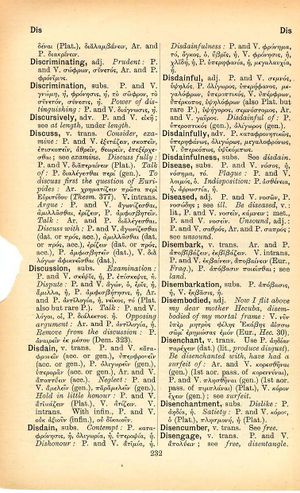disengage: Difference between revisions
From LSJ
ταῦτα δὲ ἔδει ποιῆσαι κἀκεῖνα μὴ ἀφιέναι → these things should have been done without neglecting the others | these are the things you should have done without neglecting the others | these ought ye to have done, and not to leave the other undone
(CSV3) |
m (Woodhouse1 replacement) |
||
| Line 1: | Line 1: | ||
{{Woodhouse1 | {{Woodhouse1 | ||
|Text=[[File:woodhouse_232.jpg|thumb|link={{filepath:woodhouse_232.jpg}}]] | |Text=[[File:woodhouse_232.jpg|thumb|link={{filepath:woodhouse_232.jpg}}]] | ||
===verb transitive=== | |||
P. and V. ἀπολύειν; see [[free]], [[disentangle]]. | [[prose|P.]] and [[verse|V.]] [[ἀπολύειν]]; see [[free]], [[disentangle]]. | ||
[[she tried to disengage her hand]]: [[Aristophanes|Ar.]] [[τὴν χεῖρ' ὑφῄρει]] (Pl. 689). | |||
[[be disengaged]], [[be at leisure]]: [[prose|P.]] and [[verse|V.]] [[σχολάζειν]]. | |||
}} | }} | ||
Revision as of 08:57, 20 May 2020
English > Greek (Woodhouse)
verb transitive
P. and V. ἀπολύειν; see free, disentangle.
she tried to disengage her hand: Ar. τὴν χεῖρ' ὑφῄρει (Pl. 689).
be disengaged, be at leisure: P. and V. σχολάζειν.

